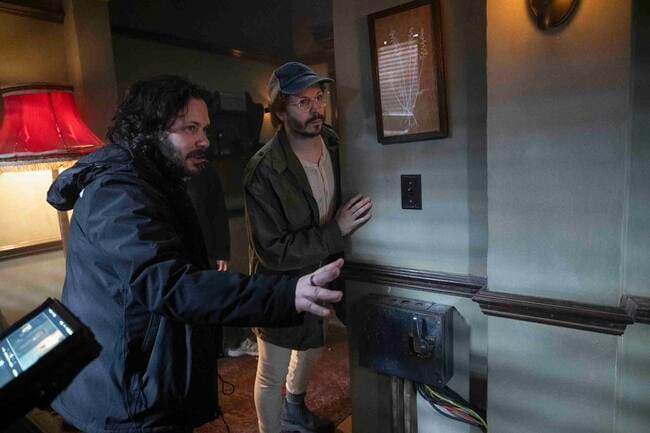Has Edgar Wright ever truly suffered? One must assume that he has, but it remains the thought I woke with after last night’s screening of The Running Man. It’s a real movie-star thrill ride from Glen Powell (Hit Man, Twisters) and a solid double from Wright (Scott Pilgrim vs. the World, Hot Fuzz), but its laudable anti-facist, anti-capitalist politics are undercut by a lifeless production design and third act that runs out of breath.
The Running Man follows Powell as Ben Richards, a good, angry man. He’s been blacklisted from working because he stood up for his coworkers’ safety. Now, his daughter is dying of the flu, and his wife is starting to compromise her boundaries as a waitress just to buy pain meds.. The only way to a better life is to compete in dangerous reality TV shows, including The Running Man, where 3 contestants are hunted for lethal sport.

Glen Powell stars in Paramount Pictures' "THE RUNNING MAN." | © 2025 PARAMOUNT PICTURES. ALL RIGHTS RESERVED. PARAMOUNT PICTURES. ALL RIGHTS RESERVED.
“...America is the greatest country in the fucking universe.”
When Stephen King wrote The Running Man (1982), he was a more experienced writer returning to the themes of his earlier work in The Long Walk (1979). Both saw their endings changed in theaters. I learned what “adaptation” is from my indignant father and grandfather ranting about the Hollywood happy ending of the original The Running Man, and its integration of wrestling and American Gladiator into the story. Today, Edgar Wright and screenwriter Michael Bacall (Scott Pilgrim vs. the World, 21 Jump Street) have added Survivor (2000-), Fox News, Generative AI, and Luigi Mangione into the mix.
Good genre filmmaking reflects the anxieties of the times. In this version of The Running Man, a crypto-like currency called “new money” is wildly inflated in value and used as a tool of social control. Healthcare is out of reach. The leaders meant to protect the people have betrayed them. Parents are radicalized against their own interests by television networks, and everyone is under surveillance while paramilitary men in masks invade neighborhoods while committing acts of violence for the camera. The near-future is now in this film, but also 10 years from now in the empty, LED-wall riddled world that is both too interesting to represent fascistic aesthetics and too uniform to represent the democratic chaos of real streets. “Hundreds of LED walls and not a single pixel burnt out” sounds like a silly complaint, but it’s emblematic of the core issue with this film. It always stops short of realization.

Director Edgar Wright, left, and Micahel Cera on the set of Paramount Pictures' "THE RUNNING MAN." | © 2025 PARAMOUNT PICTURES. ALL RIGHTS RESERVED. PARAMOUNT PICTURES. ALL RIGHTS RESERVED.
“ …critics say that The Running Man signals a return to the barbarism of the Roman Colosseum.”
Maybe Wright is entering a new phase of his style that started with Last Night in Soho 2022) – a third film will make a trend – but the frantic camera that made him famous is now balletic, and not quite painterly. Graphic novel-y? The colors and compositions are pop art, even when the story calls instead for pulp; the plastic sheen of eshitification retards attempts at critique. There is a moment where the masked men hunting Powell charge towards the camera in front of a Patton-esque American flag. What should be a moment of horrific triumph is instead an empty splash page.
What’s not empty is Glen Powell’s performance, which sits next to Hit Man (2023) as one of his best. There is a marked difference in this life between the anger of a rich man and a poor man when they are insulted, and Powell’s seething anger is brilliantly accurate and entertaining. It’s his reactions to the insults of Josh Brolin’s (Hail Caesar, No Country for Old Men) billionaire character and the various indignities of his life that make this film a fun time at the movies. It’s refreshing to say that a film is worth your time just to watch a fun performance, but that’s what being a movie star is really all about. Jayme Lawson (Sinners, How to Blow Up a Pipeline) is hitting homers every time the film remembers to let her act in her small role as the wife, and Emilia Jones (Task, Coda) is also very good in her too-limited screen time. In general, all of the performances are up to snuff here, but as the movie races towards the end, you can feel the actors having to bend their knees a little more to make the emotional leaps to their next scene.
It’s a dangerous moment in America, and art of all qualities is trying to say something about that. The Running Man has quite a bit to say about a lot of it, from monologues to world-building details. Great films like Sinners (2025) and One Battle After Another (2025) resonate because they express well-thought-out beliefs through the tone and structure of genre filmmaking. As things progress, artists are drawn into the fold who have to express new feelings in their work. Instead of eloquent statements, their voices often give panicked shouts that “somebody has to do something! Please, god!” It takes both, sometimes, for the message to be heard. But only one is edifying.
Cynicism is not hopelessness, but a habitual rejection of wishful thinking. Taken too far, the cynic can shut themselves off from new joys, but practiced well, and it becomes a habit of contentment with the things you have managed to fight for. This is the cynicism at the heart of King’s best work, and Glen Powell’s performance. It is not the cynicism at the heart of the 3rd act of The Running Man, which exists perpetually in indignation, at odds with its own material and the better works it stands beside.
Final Score: 3.5/5
Edgar Wright’s The Running Man is in theaters November 14th, 2025.